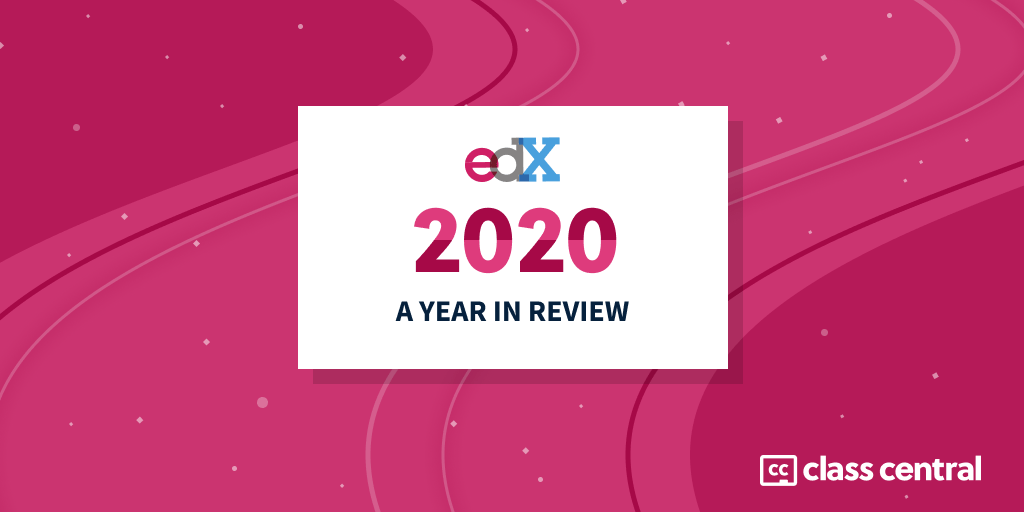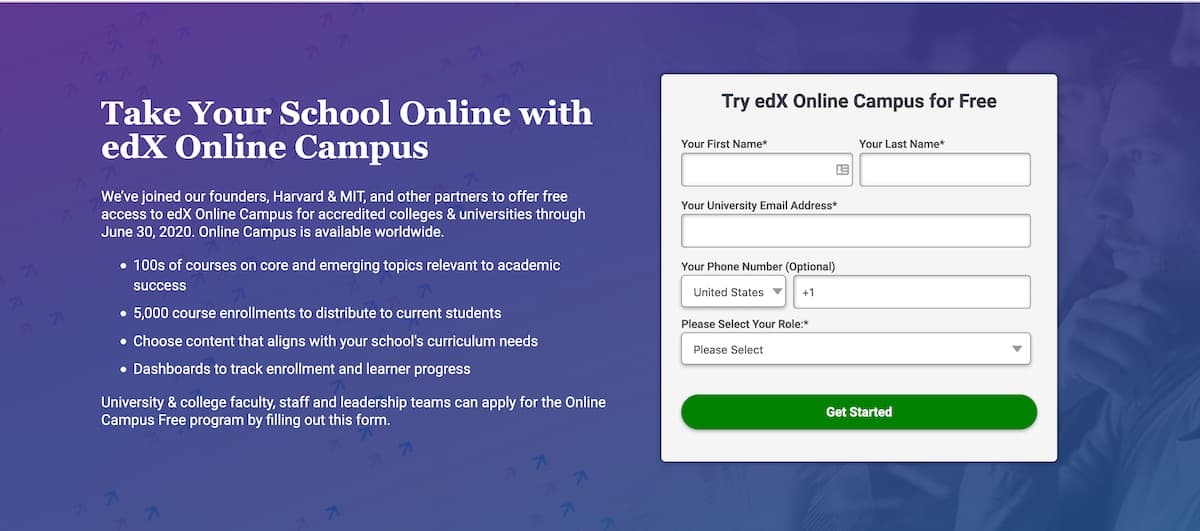EdX’s 2020: Year in Review
In 2020, edX attracted 10 million new users and became one of the world’s top-1000 websites.

Due to the pandemic, interest in online education has exploded. As a result, edX became one of the world’s 1000 most visited websites in 2020.
edX’s total registered users grew to 35 million, up from 25 million last year. Cumulatively, these learners have enrolled 110 million times in edX’s courses or programs.
In 2020, edX added 13 new partners, including Stanford, Cambridge, and Google. So the world’s most well-known and prestigious universities now offer courses on edX: Stanford, Harvard, MIT, Oxford, and Cambridge. By contrast, only Stanford offers courses on Coursera.
In 2020, the Harvard and MIT-backed nonprofit launched a new credential called MicroBachelors, started offering higher-priced Executive Education courses, and launched a new product line for universities called edX Online Campus.
For Class Central‘s complete analysis of edX’s 2020, keep reading. For our previous years’ analyses, follow the links:
- Edx’s 2019: Year in Review
- Edx’s 2018: Year in Review
- Edx’s 2017: Year in Review
- Edx’s 2016: Year in Review

By the Numbers
| 2016 | 2017 | 2018 | 2019 | 2020 | |
| Courses | 1,290 | 1,820 | 2,275 | 2,650 | 3,090 |
| Microcredentials | 118 | 174 | 233 | 292 | 385 |
| Master’s Degrees | 0 | 1 | 9 | 10 | 13 |
| Learners | 10M | 14M | 18M | 25M | 35M |
| Revenue | $15M | $25M | $37M | NA | NA |
Most of edX’s 10 million new learners joined in the months that followed the implementation of quarantine measures around the globe. We wrote about this in By The Numbers: MOOCs During the Pandemic.
As we approach the end of 2020, the pandemic boost has mostly abated. edX numbers seem higher than pre-pandemic, but nowhere close to pandemic peak.
Revenue
| Fiscal Year (end in June) | Contributions & Grants | Program Services |
| 2018 | $19,770,580 | $37,144,085 |
| 2017 | $25,749,405 | $24,909,208 |
| 2016 | $23,826,449 | $14,878,188 |
| 2015 | $22,873,789 | $9,958,262 |
| 2014 | $17,184,161 | $3,411,758 |
| 2013 | $25,836,362 | $0 |
Since edX is a nonprofit, their tax returns are public. The latest one is for the 2018 fiscal year. The total revenue (not including contributions and grants) was $37 million. By comparison, in 2018, Coursera’s revenue was reported to be about $140 million.
edX’s “Program Services” revenue, which mostly consists of revenue from certificates, has been growing about 50% every year.
In late 2018, edX instituted a paywall for graded assignments and removed the unlimited access to course content. We might soon see the results of this change.
Courses
edX has now 3,090 active courses, up from 2,650 last year. Data collected by Class Central shows that they’ve announced around 700 online courses in 2020.
Here are edX’s ten most popular courses by enrollment launched in 2020. The top course has 300K enrollments, while the #10 has around 30K.
- Mechanical Ventilation for COVID-19 from Harvard University ★★★★★(19)
- CS50’s Introduction to Artificial Intelligence with Python from Harvard University ★★★★★(1)
- How to Learn Online ★★★★★(2)
- Inglés básico: conversacional y networking from Universidad Anáhuac ★★★★★(42)
- Exercising Leadership: Foundational Principles from Harvard University
- AI for Everyone: Master the Basics from IBM
- Introduction to Data Science from IBM ★☆☆☆☆(1)
- Basics of Computing and Programming from New York University (NYU) ★★★★☆(2)
- EmSAT English Preparation – Level 1 from United Arab Emirates University ★★★★★(1)
- Covid – 19: Ventilación mecánica para no intensivistas from The Pontificia Universidad Javeriana
Microcredentials
| 2016 | 2017 | 2018 | 2019 | 2020 | |
| XSeries | 45 | 32 | 29 | 40 | 40 |
| MicroMasters | 20 | 43 | 51 | 56 | 67 |
| Professional Education | 53 | 64 | 62 | 73 | 94 |
| Professional Certificate | 0 | 35 | 91 | 123 | 176 |
| MicroBachelors | 0 | 0 | 0 | 0 | 8 |
| Total | 118 | 174 | 233 | 292 | 385 |
Currently, edX lists 385 microcredentials (up from 292 last year) of 5 different types. The table above shows how each microcredential type has grown over the years. In 2020, edX launched a new kind of microcredential: MicroBachelors.
MicroBachelors
 MicroBachelor programs are similar to MicroMasters but for undergrad. Another difference is that they carry standalone credit, granted by Thomas Edision State University or Western Governors University. MicroMasters, by contrast, only grant credit for specific master’s degree programs.
MicroBachelor programs are similar to MicroMasters but for undergrad. Another difference is that they carry standalone credit, granted by Thomas Edision State University or Western Governors University. MicroMasters, by contrast, only grant credit for specific master’s degree programs.
The average price of the credit offered is $166.
Currently, edX offers eight MicroBachelors:
- Programming & Data Structures from New York University (NYU)
- Computer Science Fundamentals from New York University (NYU)
- Professional Writing from Arizona State University
- Introduction to Information Technology from Western Governors University
- Elements of Data Science from Rice University
- Marketing Essentials from Doane University
- Introduction to Databases from New York University (NYU)
- Cybersecurity Fundamentals from New York University (NYU)
Executive Education
In 2020, edX also launched a new line of higher-priced online courses under the Executive Education banner. These courses have a fixed schedule, are 4 to 6 weeks long, and are priced between $999 and $3,599.
Currently there are five such programs. Many (if not all) of the universities offering these programs also offer similar programs (in terms of price and target audience) on different providers.
| Program | University | Price |
| Connected Strategy: Maximizing Customer Engagement | Wharton | $3,599 |
| Leading Digital Supply Chain Transformation in the Post-COVID-19 Era | UT Austin & Boston University | $2,999 |
| Africa Live! Entrepreneurship in Emerging Economies | Harvard | $999 |
| Business Analytics Fundamentals for Leaders | Babson College | $1,499 |
| Corporate Entrepreneurship | Columbia University | $2,500 |
EdX Online Master’s Degrees
In 2020, edX announced four new online degrees and removed one, the marketing master’s from Curtin University.
This isn’t the first time they’ve removed a degree. Last year, Class Central’s Report noticed that the data science master’s degree offered by the University of California, San Diego, wasn’t listed on the provider’s page anymore.
Purdue University and the University of Texas at Austin, which already offered degrees on edX, each launched two new degrees. Purdue’s degrees were announced back in 2019, when Purdue became edX’s 7th degree partner.
Below is a list of all the degrees announced by edX. Nine other degrees are in development, but edX hasn’t shared details yet.
| Degree Name | University | Cost |
| [+] Nutritional Sciences | The University of Texas at Austin | $25,300 |
| [+] Mechanical Engineering | Purdue University | $22,500 |
| [+] Data Science | The University of Texas at Austin | $10,000 |
| [+] Civil Engineering | Purdue University | $22,500 |
| Electrical and Computer Engineering | Purdue University | $22,500 |
| Leadership: Service Innovation | University of Queensland | < AU$25,000 |
| Business Administration (MBA) | Boston University | $24,000 |
| IT Management | Indiana University | $21,000 |
| Accounting | Indiana University | $21,000 |
| Cybersecurity | Georgia Institute of Technology | $9,920 |
| Analytics | Georgia Institute of Technology | $9,900 |
| Supply Chain Management | Arizona State University | $19,080 |
| Computer Science | The University of Texas at Austin | $10,000 |
| [-] Marketing | Curtin University | AU$25,850 |
EdX Partners
EdX currently lists 133 partners, including universities and organizations such as Google and Microsoft.
In 2020, they added 13 new partners:
- University of Cambridge
- Stanford University
- Université de Montréal
- Western Governors University
- United Arab Emirates University
- University of Bayreuth
- University of Canterbury
- Zürich University of Applied Sciences
- University of Alaska Fairbanks
- State Bank of India
- Arm Education
- Check Point Software Technologies
Pandemic Response & Impact

On March 11th, edX launched its Remote Access Program which allowed their university partners’ students to access edX’s catalog for free. 60 partners ended up taking the offer.
Perhaps taking a cue from Coursera, in mid April, edX expanded the program to all universities. The edX Online Campus, as it’s called, was limited to 5000 course enrollments per university through June 30, 2020. A limited selection of edX’s catalog was available through the program.
Just a few days ago, edX announced Online Campus Essentials, which allows universities to access edX’s learning platform tools and give their students access to ~100 online courses for free.

In the first week of April, edX and Harvard launched a free course on ventilators. It has now 300K enrollments.
According to edX’s Impact Report, 85K learners use the platform every day.
Leadership

In 2020, edX’s leadership grew by three people. Here’s how it currently looks:
- Anant Agarwal, Founder and co-CEO
- Adam Medros, President and co-CEO
- Johannes Heinlein, Chief Commercial Officer and Senior Vice President of Strategic Partnerships
- Stephanie Brocoum, Chief Marketing Officer
- Nell Ma’luf, Vice President and General Counsel
- Kathy Pugh, Vice President of Services
- Lee Rubenstein, Vice President of Business Development
- JP Beaudry, Vice President of Engineering
- Peter Brau, Vice President of Finance
- Lauren Holliday, Vice President of Product
- Nina Huntemann, Senior Director of Academics and Research
- [+] Clive Wright, Vice President of Sales and Client Success
- [+] Cathleen Coyle Webster, Vice President of Development
- [+] Mike Hebert, Senior Director of People and Culture
Tags







Ajay Dundi
Edx’s instructor paced courses are the best among all MOOC’s and the quality of these courses is so rigorous. Other MOOC platforms the quality is not good and looks like we learn to add certificates to our CV whereas on edx we really learn something and come out satisfied irrespective of whether we get the certificate or not.
Choen Krainara
Yes, it is a rigorous study in order to get a verified certificate from edX.
Hala
Hello Dhawal,
Thanks for this great review.
Do you have numbers and stats like how many registered during 2020 in a certain course or master’s degree?